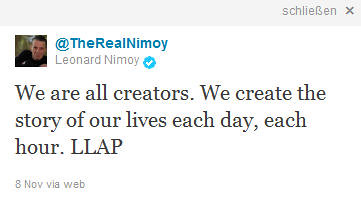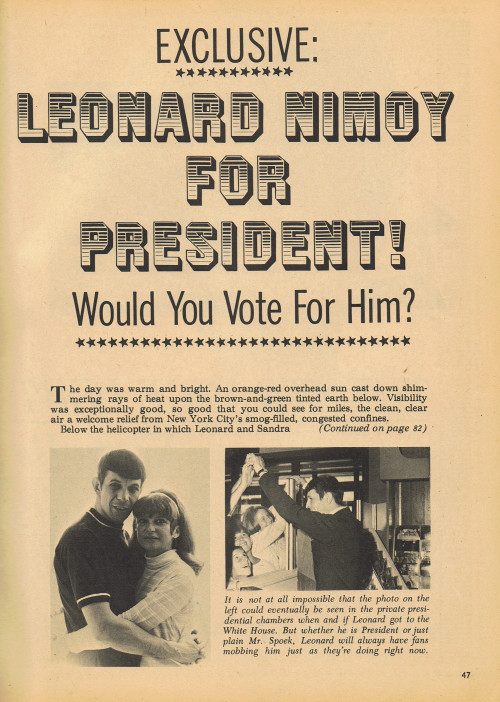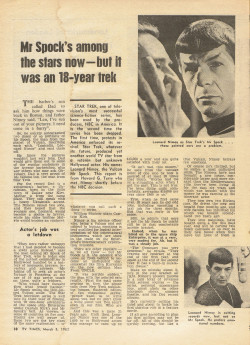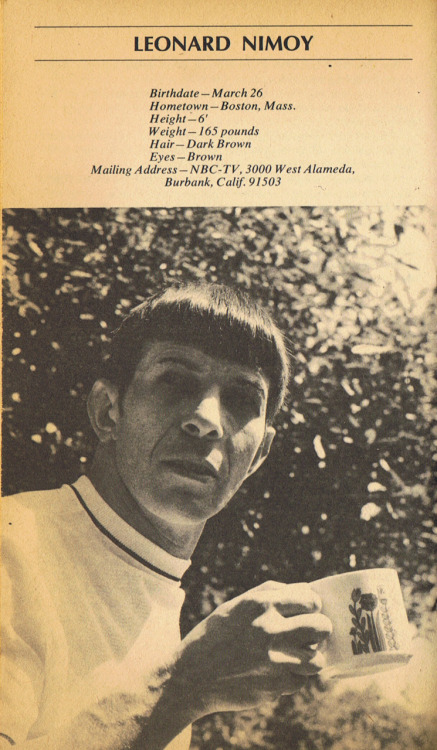Take it with a grain of salt...
 The stories of our lives. Who controls them? Who creates them? Is it really only us? Where a celebrity is concerned, there are those who make money off the stories they sell. A juicy headline often helps...
The stories of our lives. Who controls them? Who creates them? Is it really only us? Where a celebrity is concerned, there are those who make money off the stories they sell. A juicy headline often helps...
Confessions of a Former Vulcan
The fact that Mr. Spock may have exuded a certain degree of on-screen sex appeal would probably not have come as a surprise to LeonardNimoy, who has played thecharacter off and on for almost three decades. In fact, Nimoy once admitted that after the Star Trek episode Amok Time - in which Spock is possessed by pon far, a Vulcan mating drive — his fan mail jumped from a few hundred letters to 10,000 a week.
Read it all here.

I've been seeing some of those banners/buttons lately on the Internet and it seemed as good a time as any to dig up the interview below dating back to 1968. While the tone is schmaltzy, drippingly so, it offers a peek into the political past when the idea that show business people could aspire to become Presidents was something that society had just begun to mull over. The article also offers a bit of information that I haven't much come across elsewhere. Common lore has it that Mr. Nimoy was hired by Gene Roddenberry to play Spock after appearing in an episode of The Lieutenant that Roddenberry produced at the time. But here it is suggested that he was at least also cast on the strength of his portrayal in Death Watch and, see the article below this one, Dr. Kildare. While the shoe fit, Mr. Nimoy being cast as Spock was no fairy tale. The producers of Star Trek did do their homework.
Leonard Nimoy for President

During that period of intense struggle, Leonard found that few people knew he even existed. Agents paid no heed; acting jobs were few and far between. "But I always had work of some sort," Leonard said. "I worked as a cab driver, dishwasher and at whatever else happened to be available at the time. But for the true artist, this is a kind of slow death. Anything is when he yearns to create and doesn't have the opportunity to do so."
There was an exception -- Death Watch, that controversial Jean Genet film which was directed by Leonard's good friend, Vic Morrow, and in which he starred with Michael Forest Paul and Mazurki [sic.]. Speaking of that film, he exclaimed, "I had seen it with Vic years before as a play in the Los Angeles area. It got under our skin. We couldn't forget it. We knew we would never be satisfied until we did it as a motion picture."
Which involved more sacrifice, more scrimping, more bouts with hunger as he worked feverishly with Vic to raise the cost of the production which has been reported at $125,000, chicken-feed in today's inflated film market, but a fortune when you had as little money as the two of them did at that time. [Earlier in the article his yearly income was given at $2000 to $3000] But made it was, and in the end, Death Watch will earn them a rather healthy profit quite apart from the other very substantial benefits it brought Leonard.
"The producers of Star Trek saw it at a screening one evening," he said, "and a few days later I received a call, from their assistant director, asking that I report for a test at my earliest convenience."
Even back then in 1968 he had an insight that would hold true for the rest of his life because people to this day would assign qualities belonging to the famous character he played to the actor himself.
As evidenced by this inadvertent phrase in an UK Daily Mail article about Patterns of Force being first show on free TV in Germany in 2011.
I've been showcasing quite a few tabloid stories from the late 60's and all concerned emphasized on the Nimoy's being poor as church mice and often close enough to starvation before being saved by Star Trek (see the above one for a particular heart-wrenching rendition) in keeping with the fairy tale trope and it's modern cousin, the rags to riches story. It took an Australian magazine to put it right in 1969.
Mr. Spock's among the stars now - but it was an 18-year trek

"It was terribly sudden," the man with the pointed ears recalls. "First the mail came pouring in, then the phone calls from New York publishing houses, flustered editors of fan magazines saying, "people want us to write about you, but we don't know a thing about you. You aren't even in our files. Who are you?"
And this was a mere 2 1/2 years ago. Until then, Leonard Nimoy was one of the 1,000 or so Hollywood actors who manage to earn up to $15,000 a year and are quite satisfied with their lot.
"It isn't bad this money," he says from the vantage point of one who by now is assured of at least 20 times that much, "Stories had me as a struggling actor when I got the part. This is not true. I've been doing quite comfortably, averaging $15,000 per year since 1960 or so."
True, when he first came over, 18 years ago he did odd jobs, including operating a taxi cab for three months. But that was early in the game.
Still, he admits that were it not for Mr. Spock he might still be in that comfortable income bracket.
(...)
When Mr. Spock goes, the Enterprise having berthed for good, one Leonard Nimoy,
actor, will go on to new jobs, and do as well if not a lot better.
"Don't forget," he reminds you, "that mine was not type casting. Quite the opposite was the case. It was my ability to play roles worlds apart that convinced Gene Roddenberry that I was his man."
The producer first saw him in the role of a brash movie prompter in an episode of his own The Lieutenant series, and then compared this portrayal to Nimoy in an episode of Dr. Kildare, playing a shy, introspective character.
 Surely the teen magazines felt the pressure most acutely and so his name is among those featured on the front cover of Flip's "Groovy Guide to the Stars" in May 1969. But there it doesn't end. He's not just listed among the "Groovy Guys", but within that list that distinguishes the mere groovy guys from the 50 "Super Stars" that have a place reserved for them at the top of the list. The list is sorted alphabetically and so his name shines up among the likes of Mick Jagger, Paul McCartney and Elvis, Warren Beatty and Dustin Hoffman, to pick only a few. (On a side note, William Shatner is not in it, but Walter Koenig is. The producer's rationale for bringing him in seems to have worked.)
Surely the teen magazines felt the pressure most acutely and so his name is among those featured on the front cover of Flip's "Groovy Guide to the Stars" in May 1969. But there it doesn't end. He's not just listed among the "Groovy Guys", but within that list that distinguishes the mere groovy guys from the 50 "Super Stars" that have a place reserved for them at the top of the list. The list is sorted alphabetically and so his name shines up among the likes of Mick Jagger, Paul McCartney and Elvis, Warren Beatty and Dustin Hoffman, to pick only a few. (On a side note, William Shatner is not in it, but Walter Koenig is. The producer's rationale for bringing him in seems to have worked.)
Since we've been speaking of fairy tales, no fairy tale can ever be complete without a happy ending as once more demonstrated in the following soppy story that contrasts the state of Leonard Nimoy's marriage to that of William Shatner's. (Just head over to Interviews if you need any more proof. Don't be fooled - while the headlines are lurid, the stories serve to reaffirm the idyll of matrimonial bliss and family.)
When exactly Leonard Nimoy started to feel different about his first wife and when those feelings became oppressive, only he knows. But, since unlike a fairy tale his narrative didn't end after Star Trek in 1969, the press smoothly moved on to another, more modern, script that called for more drama. As Mr. Nimoy said once about the media's continued fascination with the difficulty he and William Shatner experienced while filming the original series: if there is no conflict, there is no drama and if there's no drama, there's no story. And so we've been reading about feuds, dissent, and rejection. I'm Not Spock. A gift handed to the press on a silver platter with shockwaves reverberating right up to Star Trek III, where reportedly the studio had doubts about handing him the director's chair for The Search for Spock. Today he can joke about it at conventions.
The interviews from the late 70's on focus more on his career and new projects, Star Trek and Spock, with the occasional home story interspersed. Now he's established himself as, and being taken seriously as, a photographer. He has found his true calling at last, happiness in his second marriage and (semi) retirement. J.J. Abrams, one of the hottest producers in Hollywood at the moment, wanted him for his projects. He has come to terms with the vagaries of life. He is called and revered and put on a pedestal as the elder statesman (of Star Trek), imbibed with the wisdom of age and hard won insight. The hero's journey has been completed in grace and style.
We couldn't be more happy for him. However, when we read about it, we should take the narrative with a grain of salt. Just follow his example...
|
Bruno Mars The Lazy Song .. alternate version... von sourcexx |

